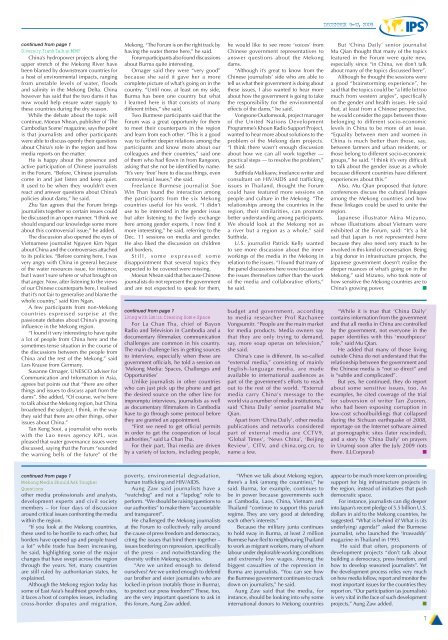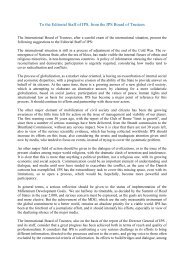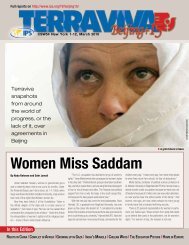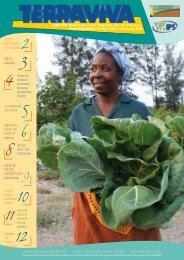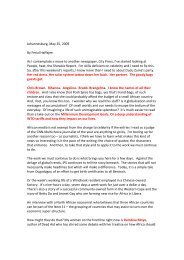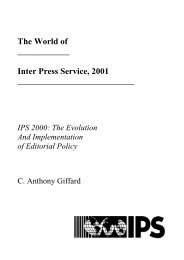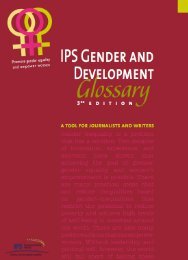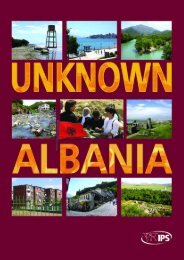Diversity, Frank Talk at MMF - IPS Inter Press Service
Diversity, Frank Talk at MMF - IPS Inter Press Service
Diversity, Frank Talk at MMF - IPS Inter Press Service
You also want an ePaper? Increase the reach of your titles
YUMPU automatically turns print PDFs into web optimized ePapers that Google loves.
DECEMBER 9-12, 2009<br />
continued from page 1<br />
<strong>Diversity</strong>, <strong>Frank</strong> <strong>Talk</strong> <strong>at</strong> <strong>MMF</strong><br />
China’s hydropower projects along the<br />
upper stretch of the Mekong River have<br />
been blamed by downstream countries for<br />
a host of environmental impacts, ranging<br />
from unstable levels of w<strong>at</strong>er, floods<br />
and salinity in the Mekong Delta. China<br />
however has said th<strong>at</strong> the two dams it has<br />
now would help ensure w<strong>at</strong>er supply to<br />
these countries during the dry season.<br />
While the deb<strong>at</strong>e about the topic will<br />
continue, Moeun Nhean, publisher of ‘The<br />
Cambodian Scene’ magazine, says the point<br />
is th<strong>at</strong> journalists and other participants<br />
were able to discuss openly their questions<br />
about China’s role in the region and how<br />
media reports on the m<strong>at</strong>ter.<br />
He is happy about the presence and<br />
active particip<strong>at</strong>ion of Chinese journalists<br />
in the Forum. “Before, Chinese journalists<br />
come in and just listen and keep quiet.<br />
It used to be when they wouldn’t even<br />
react and answer questions about China’s<br />
policies about dams,” he said.<br />
Zhu Yan agrees th<strong>at</strong> the Forum brings<br />
journalists together so certain issues could<br />
be discussed in an open manner. “I think we<br />
should expand our knowledge some more<br />
about this controversial issue,” he added.<br />
The discussion also opened the eyes of<br />
Vietnamese journalist Nguyen Kim Ngan<br />
about China and the controversies <strong>at</strong>tached<br />
to its policies. “Before coming here, I was<br />
very angry with China in general because<br />
of the w<strong>at</strong>er resources issue, for instance,<br />
but I wasn’t sure where or wh<strong>at</strong> brought on<br />
th<strong>at</strong> anger. Now, after listening to the views<br />
of our Chinese counterparts here, I realised<br />
th<strong>at</strong> it’s not fair to generalise and blame the<br />
whole country,” said Kim Ngan.<br />
A few participants from non-Mekong<br />
countries expressed surprise <strong>at</strong> the<br />
passion<strong>at</strong>e deb<strong>at</strong>es about China’s growing<br />
influence in the Mekong region.<br />
“I found it very interesting to have quite<br />
a lot of people from China here and the<br />
sometimes tense situ<strong>at</strong>ion in the course of<br />
the discussions between the people from<br />
China and the rest of the Mekong,” said<br />
Lars Krause from Germany.<br />
Susanne Ornager, UNESCO adviser for<br />
Communic<strong>at</strong>ion and Inform<strong>at</strong>ion in Asia,<br />
agrees but points out th<strong>at</strong> “there are other<br />
things and issues to discuss apart from the<br />
dams”. She added, “Of course, we’re here<br />
to talk about the Mekong region, but China<br />
broadened the subject, I think, in the way<br />
they said th<strong>at</strong> there are other things, other<br />
issues about China.”<br />
Tan Keng Sooi, a journalist who works<br />
with the Lao news agency KPL, was<br />
pleased th<strong>at</strong> w<strong>at</strong>er governance issues were<br />
discussed, saying th<strong>at</strong> the Forum “sounded<br />
the warning bells of the future” of the<br />
Mekong. “The Forum is on the right track by<br />
having the w<strong>at</strong>er theme here,” he said.<br />
Forum participants also found discussions<br />
about Burma quite interesting.<br />
Ornager said they were “very good”<br />
because she said it gave her a more<br />
complete picture of wh<strong>at</strong>’s going on in the<br />
country. “Until now, <strong>at</strong> least on my side,<br />
Burma has been one country but wh<strong>at</strong><br />
I learned here is th<strong>at</strong> consists of many<br />
different tribes,” she said.<br />
Two Burmese participants said th<strong>at</strong> the<br />
Forum was a gre<strong>at</strong> opportunity for them<br />
to meet their counterparts in the region<br />
and learn from each other. “This is a good<br />
way to further deeper rel<strong>at</strong>ions among the<br />
participants and know more about our<br />
colleagues and their countries,” said one<br />
of them who had flown in from Rangoon,<br />
asking th<strong>at</strong> she not be identified by name.<br />
“It’s very ‘free’ here to discuss things, even<br />
controversial issues,” she said.<br />
Freelance Burmese journalist Soe<br />
Win Than found the interaction among<br />
the participants from the six Mekong<br />
countries useful for his work. “I didn’t<br />
use to be interested in the gender issue<br />
but after listening to the lively exchange<br />
here among gender experts, I now find it<br />
more interesting,” he said, referring to the<br />
Dec. 11 sessions on media and gender.<br />
He also liked the discussion on children<br />
and borders.<br />
Still, some expressed some<br />
disappointment th<strong>at</strong> several topics they<br />
expected to be covered were missing.<br />
Moeun Nhean said th<strong>at</strong> because Chinese<br />
journalists do not represent the government<br />
and are not expected to speak for them,<br />
continued from page 1<br />
Living with Limits, Cre<strong>at</strong>ing Some Space<br />
For La Chan Tha, chief of Bayon<br />
Radio and Television in Cambodia and a<br />
documentary filmmaker, communic<strong>at</strong>ion<br />
challenges are common in his country.<br />
The main challenge lies in getting sources<br />
to interview, especially when these are<br />
government officials, he told a session on<br />
‘Mekong Media: Spaces, Challenges and<br />
Opportunities’<br />
Unlike journalists in other countries<br />
who can just pick up the phone and get<br />
the desired source on the other line for<br />
impromptu interviews, journalists as well<br />
as documentary filmmakers in Cambodia<br />
have to go through some protocol before<br />
they are granted an appointment.<br />
“First we need to get official permits<br />
in order to get the cooper<strong>at</strong>ion of local<br />
authorities,” said La Chan Tha.<br />
For their part, Thai media are driven<br />
by a variety of factors, including people,<br />
he would like to see more ‘voices’ from<br />
Chinese government represent<strong>at</strong>ives to<br />
answer questions about the Mekong<br />
dams.<br />
“Although it’s gre<strong>at</strong> to know from the<br />
Chinese journalists’ side who are able to<br />
tell us wh<strong>at</strong> their government is doing about<br />
these issues, I also wanted to hear more<br />
about how the government is going to take<br />
the responsibility for the environmental<br />
effects of the dams,” he said.<br />
Vongsone Oudomsouk, project manager<br />
of the United N<strong>at</strong>ions Development<br />
Programme’s Khoun Radio Support Project,<br />
wanted to hear more about solutions to the<br />
problem of the Mekong dam projects.<br />
“I think there wasn’t enough discussion<br />
about how we can all work together —<br />
practical steps — to resolve the problem,”<br />
he said.<br />
Sutthida Malikaew, freelance writer and<br />
consultant on HIV/AIDS and trafficking<br />
issues in Thailand, thought the Forum<br />
could have fe<strong>at</strong>ured more sessions on<br />
people and culture in the Mekong. “The<br />
rel<strong>at</strong>ionships among the countries in the<br />
region, their similarities, can promote<br />
better understanding among participants.<br />
We should look <strong>at</strong> the Mekong not as<br />
a river but a region as a whole,” said<br />
Sutthida.<br />
U.S. journalist P<strong>at</strong>rick Kelly wanted<br />
to see more discussion about the inner<br />
workings of the media in the Mekong in<br />
rel<strong>at</strong>ion to the issues. “I found th<strong>at</strong> many of<br />
the panel discussions here were focused on<br />
the issues themselves r<strong>at</strong>her than the work<br />
of the media and collabor<strong>at</strong>ive efforts,”<br />
he said.<br />
budget and government, according<br />
to media researcher Prof Rachanee<br />
Vongsumitr. “People are the main market<br />
for media products. Media owners say<br />
th<strong>at</strong> they are only trying to demand,<br />
say, more soap operas on television,”<br />
she said.<br />
China’s case is different. Its so-called<br />
“external media,” consisting of mainly<br />
English-language media, are made<br />
available to intern<strong>at</strong>ional audiences as<br />
part of the government's efforts to reach<br />
out to the rest of the world. “External<br />
media carry China's message to the<br />
world via a number of media institutions,”<br />
said ‘China Daily’ senior journalist Mu<br />
Qian.<br />
Apart from ‘China Daily’, other media<br />
public<strong>at</strong>ions and networks considered<br />
part of external media are CCTV9,<br />
‘Global Times’, ‘News China’, ‘Beijing<br />
Review’, CITV, and china.org.cn, to<br />
name a few.<br />
But ‘China Daily’ senior journalist<br />
Mu Qian thought th<strong>at</strong> many of the topics<br />
fe<strong>at</strong>ured in the Forum were quite new,<br />
especially since “in China, we don’t talk<br />
about many of the topics discussed here”.<br />
Although he thought the sessions were<br />
a good “brainstorming experience”, he<br />
said th<strong>at</strong> the topics could be “a little bit too<br />
much from western angles”, specifically<br />
on the gender and health issues. He said<br />
th<strong>at</strong>, <strong>at</strong> least from a Chinese perspective,<br />
he would consider the gaps between those<br />
belonging to different socio-economic<br />
levels in China to be more of an issue.<br />
“Equality between men and women in<br />
China is much better than those, say,<br />
between farmers and urban residents, or<br />
those belong to different socio-economic<br />
groups,” he said. “I think it’s very difficult<br />
to talk about the gender issue as a whole<br />
because different countries have different<br />
experiences about this.”<br />
Also, Mu Qian proposed th<strong>at</strong> future<br />
conferences discuss the cultural linkages<br />
among the Mekong countries and how<br />
these linkages could be used to unite the<br />
region.<br />
Japanese illustr<strong>at</strong>or Akira Mizuno,<br />
whose illustr<strong>at</strong>ions about Vietnam were<br />
exhibited <strong>at</strong> the Forum, said: “It’s a bit<br />
sad th<strong>at</strong> Japan is not represented here<br />
because they also need very much to be<br />
involved in this kind of convers<strong>at</strong>ion. Being<br />
a big donor in infrastructure projects, the<br />
Japanese government doesn’t realise the<br />
deeper nuances of wh<strong>at</strong>’s going on in the<br />
Mekong,” said Mizuno, who took note of<br />
how sensitive the Mekong countries are to<br />
China’s growing power.<br />
■<br />
“While it is true th<strong>at</strong> ‘China Daily’<br />
contains inform<strong>at</strong>ion from the government<br />
and th<strong>at</strong> all media in China are controlled<br />
by the government, not everyone in the<br />
paper identifies with this ‘mouthpiece’<br />
role,” said Mu Qian.<br />
He added th<strong>at</strong> many of those living<br />
outside China do not understand th<strong>at</strong> the<br />
rel<strong>at</strong>ionship between the government and<br />
the Chinese media is “not so direct” and<br />
is “subtle and complic<strong>at</strong>ed”.<br />
But yes, he continued, they do report<br />
about some sensitive issues, too. As<br />
examples, he cited coverage of the trial<br />
for subversion of writer Tan Zuoren,<br />
who had been exposing corruption in<br />
low-cost schoolbuildings th<strong>at</strong> collapsed<br />
during the Sichuan earthquake of 2008,<br />
reportage on the <strong>Inter</strong>net software aimed<br />
<strong>at</strong> pornographic sites (l<strong>at</strong>er rescinded),<br />
and a story by ‘China Daily’ on prayers<br />
in Urumqi soon after the July 2009 riots<br />
there. (LLCorporal)<br />
■<br />
continued from page 1<br />
Mekong Media Should Ask Tougher<br />
Questions<br />
other media professionals and analysts,<br />
development experts and civil society<br />
members – for four days of discussion<br />
around critical issues confronting the media<br />
within the region.<br />
“If you look <strong>at</strong> the Mekong countries,<br />
these used to be hostile to each other, but<br />
borders have opened up and people travel<br />
a lot” while trade has been increasing,<br />
he said, highlighting some of the major<br />
changes th<strong>at</strong> have swept across the region<br />
through the years. Yet, many countries<br />
are still ruled by authoritarian st<strong>at</strong>es, he<br />
explained.<br />
Although the Mekong region today has<br />
some of East Asia’s healthiest growth r<strong>at</strong>es,<br />
it faces a host of complex issues, including<br />
cross-border disputes and migr<strong>at</strong>ion,<br />
poverty, environmental degrad<strong>at</strong>ion,<br />
human trafficking and HIV/AIDS.<br />
Aung Zaw said journalists have a<br />
“w<strong>at</strong>chdog” and not a “lapdog” role to<br />
perform. “We should be raising questions to<br />
our authorities” to make them “accountable<br />
and transparent”.<br />
He challenged the Mekong journalists<br />
<strong>at</strong> the Forum to collectively rally around<br />
the cause of press freedom and democracy,<br />
citing the issues th<strong>at</strong> bind them together –<br />
issues bordering on repression, specifically<br />
of the press – and notwithstanding the<br />
diversity within Mekong societies.<br />
“Are we united enough to defend<br />
ourselves Are we united enough to defend<br />
our brother and sister journalists who are<br />
locked in prison (notably those in Burma),<br />
to protect our press freedom” These, too,<br />
are the very important questions to ask in<br />
this forum, Aung Zaw added.<br />
“When we talk about Mekong region,<br />
there’s a link (among the countries),” he<br />
said. Burma, for example, continues to<br />
be in power because governments such<br />
as Cambodia, Laos, China, Vietnam and<br />
Thailand “continue to support this pariah<br />
regime. They are very good <strong>at</strong> defending<br />
each other’s interests.”<br />
Because the military junta continues<br />
to hold sway in Burma, <strong>at</strong> least 2 million<br />
Burmese have fled to neighbouring Thailand<br />
to work as migrant workers, many of whom<br />
labour under deplorable working conditions<br />
and extremely low wages. Among the<br />
biggest casualties of the repression in<br />
Burma are journalists. “You can see how<br />
the Burmese government continues to crack<br />
down on journalists,” he said.<br />
Aung Zaw said th<strong>at</strong> the media, for<br />
instance, should be looking into why some<br />
intern<strong>at</strong>ional donors to Mekong countries<br />
appear to be much more keen on providing<br />
support for big infrastructure projects in<br />
the region, instead of initi<strong>at</strong>ives th<strong>at</strong> push<br />
democr<strong>at</strong>ic space.<br />
For instance, journalists can dig deeper<br />
into Japan’s recent pledge of 5.5 billion U.S.<br />
dollars in aid to the Mekong countries, he<br />
suggested. “Wh<strong>at</strong> is behind it Wh<strong>at</strong> is (its<br />
underlying) agenda” asked the Burmese<br />
journalist, who launched the ‘Irrawaddy’<br />
magazine in Thailand in 1993.<br />
He said th<strong>at</strong> often, proponents of<br />
development projects “don’t talk about<br />
building a democracy, press freedom, and<br />
how to develop seasoned journalists”. Yet<br />
the development process relies very much<br />
on how media follow, report and monitor the<br />
most important issues for the countries they<br />
report on. “Our particip<strong>at</strong>ion (as journalists)<br />
is very vital in the face of such development<br />
projects,” Aung Zaw added.<br />
■<br />
7


